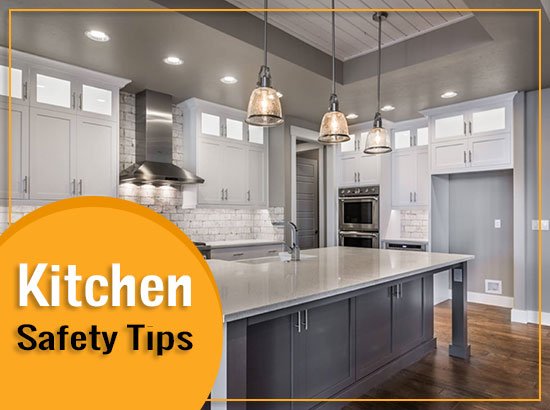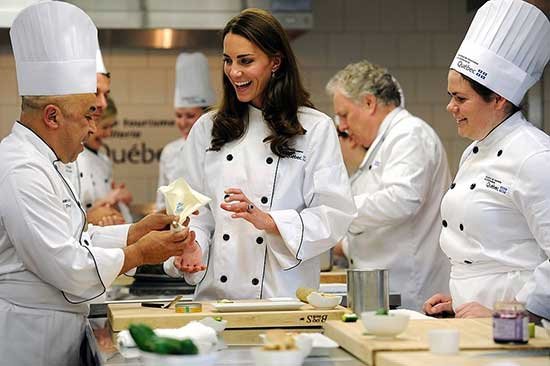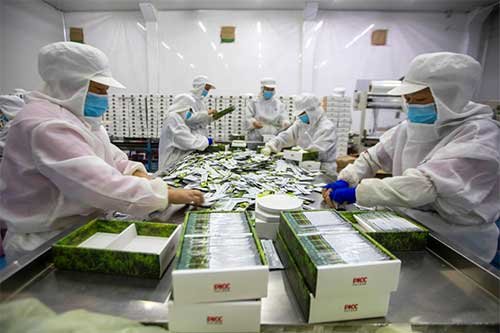
Kitchen Safety Tips: Kitchen work is generally considered a pretty safe job, at least in comparison with many industrial jobs.
However, the kitchen has many risks.
Minor injuries from burns and cuts are very common, and more severe injuries are all too possible.
The quantity of very hot equipment and powerful machinery, combined with the busy, sometimes frantic pace, making it essential for everyone to work carefully and with constant attention to some of the kitchen safety tips.
Dear viewers here are some of the Kitchen Safety Tips for the Food Industry, Chefs Should Not Skip this-

Why are Kitchen Safety Tips Important?
Read More: Kitchen Organization: Understanding the Modern Kitchen Brigade System
The Safe Workplace
Most of this unit is troubled with ways that staff can avoid certain types of accidents, for example, cuts, burns, and falls.
But, it is much easier to improve and practice habits that stop accidents if safety is built into the workplace.
A food service management division must see to it that the structure and equipment have required safety features.
1. Structure, equipment, and electric wiring in good repair.
2. Adequate lighting on work surfaces and in corridors.
3. Nonslip floors.
4. Marked exits
5. Equipment supplied with necessary safety devices
6. Heat-activated fire extinguishers over cooking equipment, especially deep fryers.
7. Appropriately located emergency equipment, for example, fire blankets, fire extinguishers, and first-aid kits
8. Posted emergency telephone numbers
9. Smooth traffic patterns to avoid collisions between workers
Preventing Cuts
1. Always use sharp knives. A sharp knife is more secured than a blunt one for the reason that it needs less pressure and is less likely to slip
2. Practice using a cutting board. Do not try to cut over a metal surface. Keep a damp towel below the board to keep it from slipping
3. Give concentration to your work when using a knife or cutting equipment
4. Cut away from yourself and other workers
5. Apply knives only for cutting, not for opening bottles6. Don’t try to catch a falling knife. Step back and let it fall
7. Don’t put knives in a sink, underwater or any place where they can’t be seen
8. Clean knives sensibly, with the sharp side away from you
9. Store knives in a secured area, for example in a rack, while not in use.
10. Carry knives correctly. Hold the knife beside you, point down, with the sharp edge back and away from you. Don’t blow your arm. If possible, carry knives in a cover. Tell people at what time you are walking past them with a knife in hand.
11. Keep breakable items, for example, dishes and glassware, out of the food production place.12. Don’t place breakable items in the pot sink.
13. Sweep up, don’t pick up, broken glass
14. Remove chipped or cracked glasses and dishes
15. Try to use different containers for broken glasses and dishes. Try not to throw them in with other garbage.
16. If there is broken glass in the sink, drain the sink before taking out the glass.
17. Remove all nails and staples when opening crates and cartons and dispose of them
Preventing Burns
1. Always take on a pot handle is hot. Don’t take it with your naked hand.
2. Try using towels or dry pads to handle hot pans. Wet ones will make steam, which can burn you.
3. Keep pan handles out of the passage so people won’t accident into them. Besides, keep away from open flames of gas burners
4. Don’t fill pans so full that they are likely to spill hot foods
5. Take help others while you will move with hot and heavy containers.
6. Open lids away from you to let vapor leak safely
7. be careful while opening a part of a steamer.
8. Confirm gas is well vented before trying to light ovens. Strike matches before turning on the gas. Also strike matches away from yourself
9. Wear long sleeves and a double-breasted chef jacket to save yourself from fallen or splattered.
10. Dry foods before placing them in frying fat or fat may splatter on you
11. When putting foods in hot fat, let them fall away from you so that fat will not drop on you.
12. Keep any liquid things away from the deep fryer; if a liquid were dropped into the fryer, the suddenly created vapor could spray hot fat on someone nearby.
13. At all times tell people when you are walking behind them with hot pans or when you are walking behind somebody who is moving with hot items.
14. Warn service people about hot plates.
Read More: Understanding a Daily Routine of Personal Hygiene in the Food Industry
Preventing Fires
1. Recognize where fire extinguishers are placed and how to use them
2. Use the appropriate type of fire extinguisher. There are three types of fires and fire extinguishers should be categorized about the sort of fire for which they can be used.
• Class A fires: wood, paper, cloth, usual combustibles
• Class B fires: burning liquids, for example, oil, grease, gasoline, solvents
• Class C fires: electrical equipment, switches, motors, and so forth. Don’t try to use water on an electrical or grease fire. You will only spread the fire.
3. Keep salt or baking soda near at your hand to put out fires on range tops
4. Keep hoods and other equipment free from grease buildup
5. Don’t leave hot fat unattended on the range
6. Smoke only in selected areas. Do not leave burning cigarettes unattended.
7. If a fire alarm sounds, try to switch off all gas and electric appliances before leaving the building.
8. Keep fire doors closed
9. Keep exits free from obstacles
Preventing Injuries from Machines and Equipment
1. Try not to operate any tools unless you know its process.
2. Use all protectors and safety on equipment. Set slicing machines at zero (blade closed) when not in use.
3. Don’t touch or remove food from any equipment while it is running, not even with a spoon or spatula
4. Unplug electric equipment before cleaning or disassembling.
5. Confirm the switch is off before powering on equipment.
6. Do not touch or handle electrical equipment, including switches, if your hands are wet or if you are standing in water.
7. Wear properly fitting clothing and tuck in apron strings to avoid getting them caught in machinery.
8. Use equipment only for the purpose intended
9. Stack pots and other equipment properly on pot racks so that they are stable and not likely to fall
Preventing fall
1. Clean up spills instantly
2. Throw salt on a greasy spot to make it less slippery while a mop is being made
3. Keep passages and stairs clear and free
4. Don’t carry stuff too large to see over
5. Walk, don’t run
6. Use a safe ladder, not chairs or piles of boxes to reach high shelves or to clean high equipment
Preventing Strains
1. Lift anything using leg muscles, not the backside.
2. Don’t turn or twist the back while lifting and make sure your footing is secured
3. Make use of a cart to transfer heavy objects long distances or get help.








